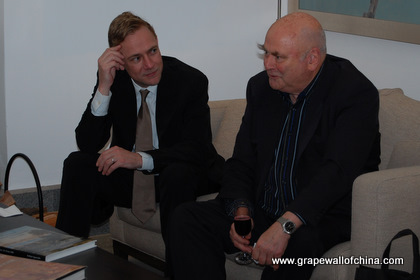By Jim Boyce | I recently talked to a bunch of trade people for a Shanghai retail story in Meininger’s Wine Business International. We could only use a small portion of their comments so I’m running bonus excerpts here.
One interviewee was Marcus Ford, who has worked in Shanghai for nearly two decades, first at M on the Bund, then at Pudao Wines and now with the associated company Langton’s East Asia.
On three things that distinguish Shanghai from other cities in China:
The dining scene. The international restaurant scene is as good as any city in Asia. That brings interesting wines and a cosmopolitan outlook on the world of wine.
Sophistication. There are pockets of really knowledgeable consumers here across pretty much every wine style and region in the world. They may be small in number but this is the beginning of a very savvy wine city.
Visitors. Shanghai is still the first port of call for producers looking at the China market. That means the trade and consumers in Shanghai have an amazing array of choice when trade bodies or producers bring their wares for tastings and other promotions.
On the impact of more hotel, restaurant and shop employees studying wine, whether it be sommelier, WSET or other courses:
We have come a long way over the past ten years and its very exciting to see the young sommeliers and educators becoming real KOLs (key opinion leaders). There is however a difference between knowledge and experience and that won’t change over night. Please remember the modern business of wine in China is still young and will take time to mature and take shape
On consumer tastes at Pudao and, particularly, attitudes to longstanding heavyweight Bordeaux:
We sell relatively small quantities of Grand Cru Classe Bordeaux. Burgundy and fine Australian wines are a much more interesting proposition for our customers than Bordeaux. I think for the majority of high-end Bordeaux buyers in China, the declining value of the wines in their cellars is a problem. It will take a few more years for that to change. Good quality mid-priced French wines are still very important and we see a growing interesting in other regions in France.
On how he describes a wine scene with a large crowd of importers / distributors compared to just a handful of players 20 years ago:
In a word, dynamic! The Shanghai wine trade is spoiled for choice in terms of the amount of companies offering different ranges of products. I think storage and transport is still a worry for many of the smaller players and the small specialists really have to work hard to sell their wines. It’s extremely competitive these days and buyers both in the trade and at a consumer level are increasingly knowledgeable when it comes to quality and value. I still think there are too many unprofessional wine businesses here that rely on guanxi rather than product and communications to sell their wines but that is slowly changing.
On the rise of a new wave of distributors after the culling that happened when the government introduced its austerity program about four years ago:
I think its too early to say, the number of importers has bounced back again from a slight slowdown and it seems as if we are back up to around 6,000 now. I think with each new wave of enthusiasm around a particular region or category you have a wave of new entrants. After each wave the real test is in the 18 months that follow. Are they shipping more wine in to China, have the exited the game already, or are they dumping their product for cash.

Note: Check out other interviews in this series, including with Simone InContro of VinItaly, Oliver Zhou of Vinehoo, Charles Carrard of Paradox, Alberto Fernandez of Torres / Everwines and Campbell Thompson of The Wine Republic.
Sign up below for my free China wine e-newsletter. And check out sibling sites World Baijiu Day and Beijing Boyce.
Grape Wall has no sponsors of advertisers: if you find the content and projects like World Marselan Day worthwhile, please help cover the costs via PayPal, WeChat or Alipay.
Sign up for the free Grape Wall newsletter here. Follow Grape Wall on LinkedIn, Instagram, Facebook and Twitter. And contact Grape Wall via grapewallofchina (at) gmail.com.

Leave a Reply
You must be logged in to post a comment.